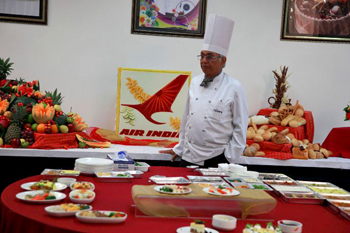Mumbai, Feb 8: In a rather embarrassing note, Air India has served a warning to all its flight attendants after a hotel in London complained that some cabin crew members would bring boxes to pack and take away food from the breakfast buffet table to be eaten later.
 Titled, 'A buffet is not a takeaway', the warning note was sent on Monday by an assistant general manager (AGM) of the in-flight service department. It said: "We have received an unfortunate email from the management of hotel in London stating that some AI crew members regularly come down for breakfast with empty boxes into which they fill food items from the buffet, presumably to eat later."
Titled, 'A buffet is not a takeaway', the warning note was sent on Monday by an assistant general manager (AGM) of the in-flight service department. It said: "We have received an unfortunate email from the management of hotel in London stating that some AI crew members regularly come down for breakfast with empty boxes into which they fill food items from the buffet, presumably to eat later."
The letter warned that AI would be forced to take serious disciplinary action against the offenders, adding that "we are aware that this could be a very small minority indulging in such a behaviour". "This may include, not being scheduled on international sectors, as we have no desire to allow the reputation of Air India to be tarnished by a handful of such individuals," the note warned.
An Air India spokesperson said: "Initially this letter appears to be fake because an AGM-grade officer is not authorised to send a circular that has pan India implications. We are investigating the issue." But cabin crew members of AI confirmed that they had received such a letter. They added that the AGM concerned was promoted to the said post only 15 days ago.
Her decision to issue a general warning to all crew hasn't gone down well. A senior cabin member, requesting anonymity, said, "There are a few rotten apples everywhere, not just among cabin crew members."
Though they decried the practice of takeaways from the buffet table, they pointed to three factors that could have got this practice going. "We land in London either at 7.30am or 6.30pm. We are dead tired by then as it's 14-15 hours from the time we have left home. So we just want to crash. Unlike earlier when the layover was 2 days, it's now only 26 hours and so we have to catch up on sleep before the next flight. Even so, only a couple of us would be bringing boxes to fill and eat later. Most don't do that," the crew member said.
"It's the worst for cabin crew who have been taken on contract as they are paid 60% less than the regular crew. The layover allowance is meagre and ranges from $600-1200 per month during which time we do at least ten layovers," he said.
Then again, room service is not provided for free in the said hotel. "It comes with a service charge of 10 pounds so as to discourage people from ordering meals in their room. So one has to dress up and go to the restaurant downstairs for a meal. The menu is limited to sandwiches and such things so one is not inclined to have that lunch/dinner every time one lands there. Since the hotel is located close to Heathrow airport, one has to take the long trip to the city to have a proper meal," he said adding which is why a couple of crew might have started taking some food to eat later.







Comments
Its okay, hotel manager is creating a puss out of it.....
Shame on you AI staff who committed this!!!
Add new comment